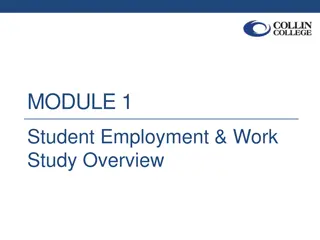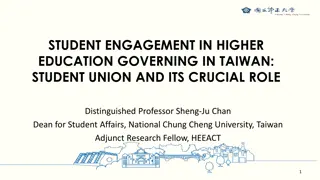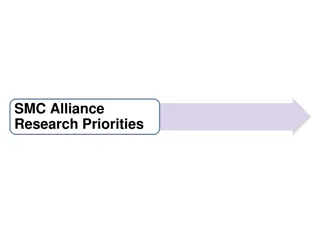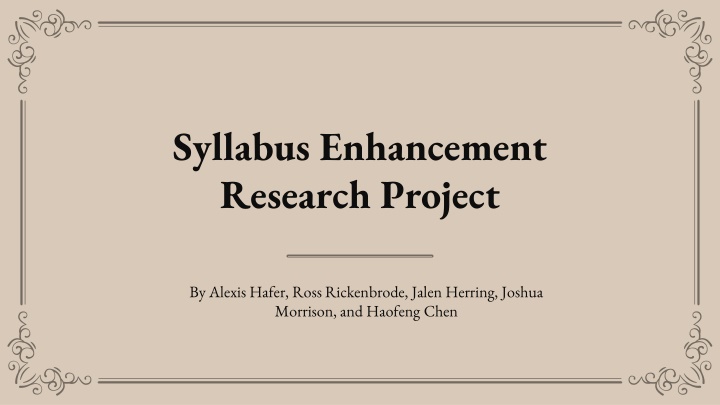
Enhancing Distance Learning Through Online Course Syllabus Elements
Explore a research project focusing on optimizing online course syllabi to boost student expectations and academic performance in distance learning. The study delves into diverse learning environments, student success, and improved experiences through comprehensive syllabus design.
Download Presentation

Please find below an Image/Link to download the presentation.
The content on the website is provided AS IS for your information and personal use only. It may not be sold, licensed, or shared on other websites without obtaining consent from the author. If you encounter any issues during the download, it is possible that the publisher has removed the file from their server.
You are allowed to download the files provided on this website for personal or commercial use, subject to the condition that they are used lawfully. All files are the property of their respective owners.
The content on the website is provided AS IS for your information and personal use only. It may not be sold, licensed, or shared on other websites without obtaining consent from the author.
E N D
Presentation Transcript
Syllabus Enhancement Research Project By Alexis Hafer, Ross Rickenbrode, Jalen Herring, Joshua Morrison, and Haofeng Chen
Table of contents 01. 02. 03. Introduction Literature Review Data/Methods Ethnographic Survey Research question Focus Article Overview Syllabus Function Course Contents 04. 05. Analysis Research Impact Individual Students Course Syllabi Potential Enhancement Scope
Introduction Research Question: Which elements should be included in an online course syllabus to facilitate and enhance students' expectations and academic performance in distance learning? Focus Diverse Learning Environments Student Success Improved Experience
Literature Review 01. Article Overview Discussed course syllabus, overlooked content, and importance of the curriculum. Syllabus function and various elements are designed for successful performance through distance learning. Current Syllabus Shortfall 02. Same syllabus passed down through multiple instructors and differing institutions Few changes made to accommodate different courses and standards Important to redesign a syllabus to maintain relevance/functionality Primary Contents 03. Instructor contact information Required learning materials Brief description of course and overviews on weekly modules/learning goals Policies, acts, accommodations, instructors course standards, university requirements
Data/Methods Survey Ethnographic Assess and improve online course Provides in-depth insight from students/ syllabi instructors Gather information from diverse Identify essential elements and academic respondents quickly policies impacting students Capture a broad spectrum of Include syllabi/relevant articles, recording opinions and experiences effective or ineffective elements
Unit of Analysis 01. Why those two units Individual Students Ethnographic Observations & Surveys Qualitative Research Students Opinion Course Syllabi Collect quantitative data Real-World Impact 02. Practical Implementation Holistic Understanding Understanding Benefits Syllabus Evaluation Exploration of Effectiveness
Research Impact Our findings will be presented by a talk via both online and in person available to everyone working in the field of education, including K-12 teachers, college professors, and school or university administrators, assisting them with research about what elements they can improve in their course syllabus. Offers insights into the effectiveness of current online course syllabi. Discovers elements that improve students' expectations and academic performance in an online course. Develops innovative approaches for enhancing communication to improve students' learning experiences. Introduces new information to promote successful communication between instructors and students
References Chen, J., Hughes, S., & Ranade, N. (2023). Reimagining student-centered learning: Accessible and inclusive syllabus design during and after the COVID-19 pandemic. Computers and Composition, 67, 102751. https://doi.org/10.1016/j.compcom.2023.102751 Provezis, S., & Bohn, D. (n.d.). Elements of an effective online course syllabus. https://staging.inside.aces.illinois.edu/sites/default/files/2021- 09/OTA%20session%20Provezis%20and%20Bohn%20070920.pdf Wagner, J. L., Smith, K. J., Johnson, C., Hilaire, M. L., & Medina, M. S. (2023, April). Best practices in syllabus design. American journal of pharmaceutical education. https://www.ncbi.nlm.nih.gov/pmc/articles/PMC10159546/ Wheeler, Lindsay B.; Palmer, Michael; and Aneece, Itiya (2019) "Students Perceptions of Course Syllabi: The Role of Syllabi in Motivating Students," International Journal for the Scholarship of Teaching and Learning: Vol. 13: No. 3, Article 7. Available at: https://doi.org/10.20429/ijsotl.2019.130307

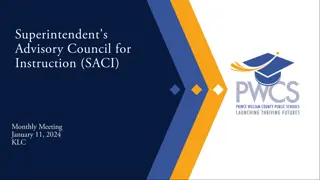
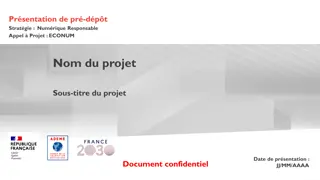

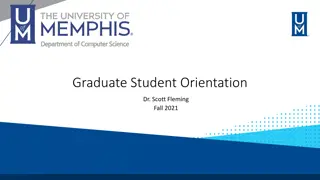
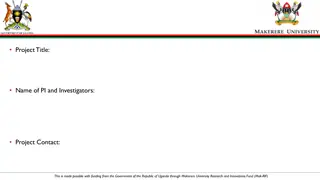



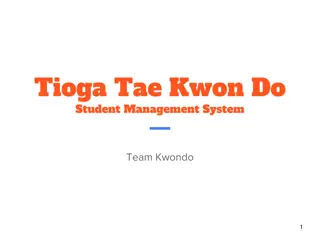


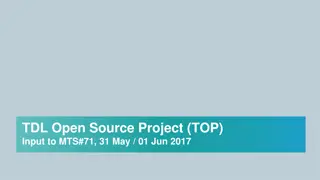
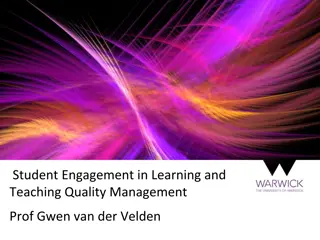
![Project Initiation Document for [Insert.Project.name] [Insert.Project.number]](/thumb/226757/project-initiation-document-for-insert-project-name-insert-project-number.jpg)

